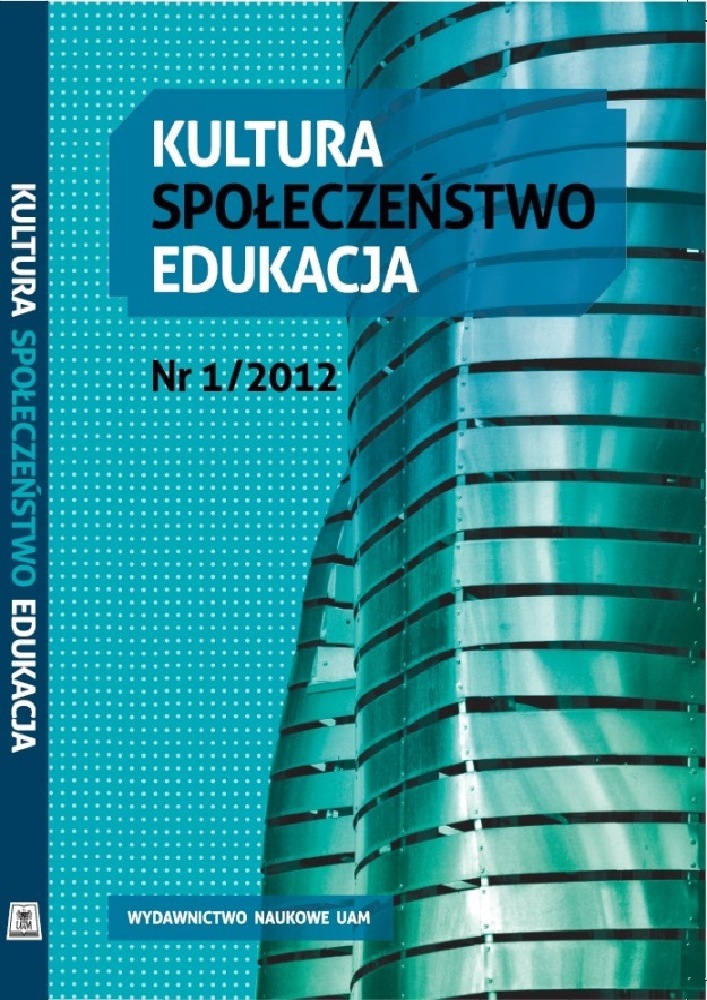Abstract
The narrative used in the article refers to the interpretational complexity of the phenomenon of contemporary society. Globalization fulfills a wide spectrum of the global world phenomena in the situation of unobviousness, diversity, ambivalence and ambiguity, which influence the new quality of sociocultural life. Trying to understand the content given to the distinguished definitions of society, intellectuals refer to the theory of the social development and to the interpretation of the mechanisms of a social change, with a focus on the spheres of social life, which are the impulses for changes taking place in the society. Emphasizing heterogeneity and changeability of forms of postmodern social organization, one may point to the following orientations capturing subtleness of the contemporary society: orientation to a global change, orientation to a certain type of civilization ascription to risk, orientation to responsibility, orientation to anticipation, orientation to responsible participation and cooperation in a changing and interdependent global society, orientation to knowledge, orientation to experience borrowed from the media, orientation to the consumption ideology. Society faces the task of selfdetermination in the situation of non-obviousness, risk, fragmentation and ambiguity. By no accident then, were the the globalizational processes in the world and a critical and permanent thought and evaluation of the changes taking place in the modern global society, in the focus of the authoress. Paying attention to the quality of the global “cultural ecumene” (U. Hannerz) inclines reflection about global changes in lifestyles which is meaningful for the quality of changes in the job world and career planning and career management practices. The sequential development of an individual (which is integrally linked with the career development) constitutes the essence of the process, which is lifelong. The economy which is based on knowledge determines the orientation on knowledge of the contemporary society. The development of careers of members in such a society is its crucial element. Moreover, the quality of socio-cultural and economic changes will demand constant career management and modification of its individualized paths.Literaturhinweise
Bańka A. 2005. Motywacja osiągnięć. Poznań - Warszawa.
Bańka A. 2007. Psychologiczne doradztwo karier. Poznań.
Bauman Z. 1994. Dwa szkice o moralności ponowoczesnej. Warszawa.
Bauman Z. 2000. Ponowoczesność jako źródło cierpień. Warszawa.
Beck U. 2002a. Społeczeństwo ryzyka. Warszawa.
Beck U. 2002b. „Kosmopolityczny makroświat”. Gazeta Wyborcza 14-15.09.
Botkin J.W., M. Elmandijra, M. Malitza. 1982. Uczyć się bez granic. Jak zewrzeć „lukę ludzką”? Warszawa.
Career Choice and Development. 1984. Ed. D. Brown, L. Brooks. San Francisco, Washington, London.
Chirkowska-Smolak T., A. Hauziński, M. Łaciak. 2011. Drogi kariery. Jak wspomagać rozwój zawodowy dzieci i młodzieży. Warszawa.
Cybal-Michalska A. 2006. Tożsamość młodzieży w perspektywie globalnego świata. Studium socjopedagogiczne. Poznań.
Domański H. 1977. „Postmodernizm a struktura społeczna”. Społeczeństwo Otwarte 23.
Drucker P.F. 1999. Społeczeństwo prokapitalistyczne. Warszawa.
Giddens A. 2001. Nowoczesność i tożsamość. Warszawa.
Giddens A. 2004. The Consequences of Modernity. Cambridge.
Globalizacja i konsumpcja. Dwa dylematy współczesności. 2003. Red. M. Bogunia-Borowska, M. Śleboda. Kraków.
Hejnicka-Bezwińska T. 1991. Orientacje życiowe młodzieży. Bydgoszcz.
Krajewski M. 1997. „Konsumpcja i współczesność. O pewnej perspektywie rozumienia świata społecznego”. Kultura i Społeczeństwo 3.
Krause A. 2001. „Dwa światy Wielkiego Brata – konsekwencje wychowawcze”. Kultura i Edukacja 3–4.
Kukołowicz T., M. Nowak. 1997. Pedagogika ogólna. Problemy aksjologiczne. Lublin.
Kwieciński Z. 2000. Tropy – ślady – próby. Poznań - Olsztyn.
Liberska B. 2002. Globalizacja – siły sprawcze i mechanizmy. W Globalizacja. Mechanizmy i wyzwania. Warszawa.
Maree J.G. 2010. „Brief Overview of the Advancement of Postmodern Approaches to Career Counseling”. Journal for Psychology in Africa 20 (3).
Maree J.G., Z. Pollard. 2009. „The Impact of Life Design Counselling on Adolescents”. Journal for Psychology in Africa” 19 (2).
Marquard O. 1994. Rozstanie z filozofią pierwszych zasad. Warszawa.
Mead M. 2000. Kultura i tożsamość. Warszawa.
Melosik Z. 1989. „Edukacja skierowana na świat – ideał wychowawczy XXI wieku”. Kwartalnik Pedagogiczny 3.
Misztal B. 2000. Teoria socjologiczna a praktyka społeczna. Kraków.
Misztal B. 2001. „Społeczeństwo wysokiego ryzyka”. Rzeczpospolita 257.
Naisbitt J. 1997. Megatrendy. Poznań.
Odmiany myślenia o edukacji. 1995. Red. J. Rutkowiak. Kraków.
Orientacje społeczne jako element mentalności. 1990. Red. J. Reykowski, K. Skarżyńska, M. Ziółkowski. Poznań.
Ossowski S. 1982. O strukturze społecznej. Warszawa.
Riesman D. 1971. Samotny tłum. Warszawa.
Strykowska M. 2001. Globalizacja a kariery zawodowe. W Społeczne problemy globalizacji. Poznań.
Sztompka P. 2002. Socjologia. Kraków.
Toffler A. 1974. Szok przyszłości. Warszawa.
Zandecki A. 1999. Wykształcenie a jakość życia. Toruń - Poznań.
Lizenz
Copyright (c) 2017 Agnieszka Cybal-Michalska

Dieses Werk steht unter der Lizenz Creative Commons Namensnennung - Keine Bearbeitungen 4.0 International.
